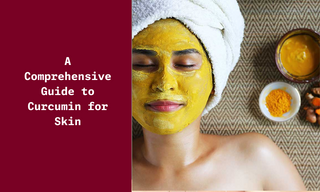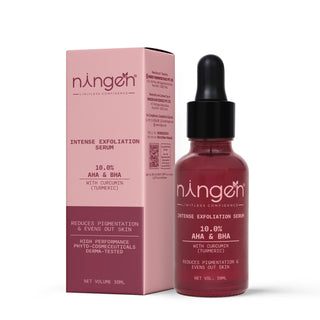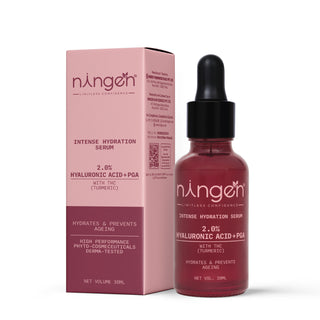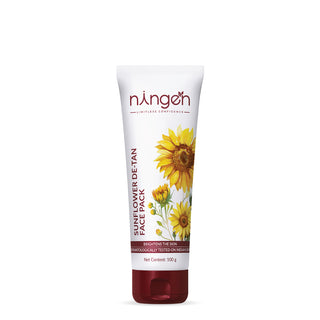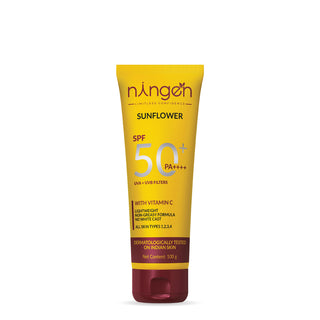“I’ve got 99 skin problems but turmeric solved like 86 of them”.
Curcumin is like the superstar in turmeric, that yellow spice you might find in your kitchen. But guess what? It's not just for adding flavor to your food – it's also a skin superhero! In simple terms, Curcumin is a natural ingredient that can do wonders for your skin.
Welcome to our comprehensive guide on Curcumin for skin – your go-to resource for unlocking the secrets of this natural powerhouse! In this blog, we'll explain everything you need to know about how Curcumin can work wonders for your skin. From its anti-inflammatory magic to its brightening brilliance, get ready to dive into the world of Curcumin and discover the radiant possibilities it holds for your skin's health and beauty. Let's embark on this journey to radiant, happy skin together!
In This Article;
- What Is Curcumin?
- Curcumin: A Detailed Scientific Guide
- Types of Curcumin for Skin
- 21 Benefits of Curcumin For Skin
- Curcuminoids: Chemical, and Physical Properties
- Curcumin: The Ancient Wonder Used in Indian Culture
- What Kind of Products Contain Turmeric?
- Is Curcumin Safe for Skin?
- How Can Turmeric Be Used in DIY Skincare?
- How to Remove Tanning From Curcumin
- Conclusion
- TL;DR(Too Long Didn't Read)
- Frequently Asked Questions
What Is Curcumin?
Curcumin is a powerful compound found in the root of the turmeric plant, which is a member of the ginger family.
It belongs to a class of compounds called curcuminoids, which are known for their antioxidant and anti-inflammatory properties. Curcumin is the active ingredient in turmeric responsible for its vibrant color, However, curcumin has gained significant attention in the health and wellness community due to its potential health benefits.

Curcumin: A Detailed Scientific Guide
Turmeric, also known by its scientific name Curcuma longa, is a flowering plant of the ginger family, Zingiberaceae. It is native to the Indian subcontinent and Southeast Asia, where it has been used for centuries as a spice, dye, and medicinal herb. The spice is derived from the dried and ground rhizomes, or underground stems, of the turmeric plant.
One of the active compounds in turmeric is curcumin, which gives the spice its distinctive yellow color and is responsible for many of its potential health benefits. Curcumin has long been used in traditional Ayurvedic and Chinese medicine to treat various conditions, and modern research has shown that it possesses anti-inflammatory, antioxidant, and anticancer properties.
Inflammation is a natural process that helps the body fight off infections and repair tissue damage, but chronic inflammation is believed to play a role in the development of many diseases, including heart disease, cancer, and neurodegenerative disorders. Curcumin has been shown to inhibit various molecules that play a role in the inflammation process, which may help reduce the risk of chronic disease and alleviate symptoms of inflammatory conditions.
Curcumin is also a powerful antioxidant, meaning that it can neutralize harmful free radicals and protect the body from oxidative stress. Free radicals are unstable molecules that can cause damage to cells and DNA, and oxidative stress has been implicated in aging and the development of various diseases. By scavenging free radicals, curcumin may help reduce the risk of chronic diseases and slow the aging process.
In addition to its anti-inflammatory and antioxidant properties, curcumin has shown promise as a potential anticancer agent. It has been found to inhibit the growth and spread of cancer cells in laboratory studies, and some research suggests that it may help enhance the effectiveness of chemotherapy and radiation therapy.
Types of Curcumin for Skin
Curcumin, the active compound in turmeric, is available in various forms and formulations for skincare, each designed to maximize its benefits. Here are the main types of curcumin used in skincare products:
1. Curcumin Extract
- Description: Pure curcumin extracted from the turmeric root.
- Benefits: Offers concentrated antioxidant and anti-inflammatory properties, ideal for reducing redness, calming irritated skin, and protecting against environmental damage.
- Usage: Found in serums, creams, and lotions.
2. Turmeric Essential Oil
- Description: Oil extracted from the turmeric root containing curcumin and other beneficial compounds.
- Benefits: Provides soothing properties, helps reduce inflammation, and promotes skin healing. The oil form allows for better penetration into the skin.
- Usage: Used in facial oils, serums, and massage blends.
3. Water-Soluble Curcumin
- Description: Curcumin modified to be soluble in water, increasing its bioavailability and absorption.
- Benefits: Easier to incorporate into water-based skincare formulations, enhancing its effectiveness in products like toners and mists.
- Usage: Found in toners, mists, and lightweight serums.
4. Liposomal Curcumin
- Description: Curcumin encapsulated in liposomes (tiny lipid vesicles) to improve stability and absorption.
- Benefits: Enhanced delivery to deeper layers of the skin, providing prolonged and effective treatment for inflammation, pigmentation, and aging.
- Usage: Common in advanced skincare products like serums and treatment creams.
5. Nano Curcumin
- Description: Curcumin broken down into nanoparticles for superior absorption and stability.
- Benefits: Maximizes curcumin’s therapeutic effects on the skin, making it highly effective in reducing fine lines, wrinkles, and hyperpigmentation.
- Usage: Found in high-performance serums, creams, and gels.
6. Curcumin Complexes
- Description: Curcumin combined with other natural compounds (e.g., piperine) to enhance its bioavailability.
- Benefits: Synergistic effects that boost curcumin’s anti-inflammatory and antioxidant properties, providing comprehensive skincare benefits.
- Usage: Included in multi-functional skincare products like anti-aging and brightening creams.
7. Topical Curcumin Gel
- Description: Gel formulations containing curcumin for targeted application.
- Benefits: Ideal for spot treatment of acne, blemishes, and localized inflammation. Provides cooling and soothing effects.
- Usage: Used in acne treatments and soothing gels.
21 Benefits of Curcumin For Skin
Curcumin, the active compound in turmeric, has been celebrated for its extensive benefits for skin health. Here are 21 benefits of curcumin for the skin:
- Anti-Inflammatory Properties:
- Reduces skin inflammation and soothes irritated skin.
- Beneficial for conditions like acne, eczema, and psoriasis.
- Antioxidant Protection:
- Neutralizes free radicals, protecting the skin from oxidative stress.
- Prevents premature aging and maintains a youthful complexion.
- Skin Brightening:
- Helps reduce the appearance of dark spots and hyperpigmentation.
- Promotes a more even skin tone and natural radiance.
- Anti-Aging Effects:
- Supports collagen production, reducing fine lines and wrinkles.
- Improves skin elasticity and firmness.
- Acne Management:
- Exhibits antibacterial properties that fight acne-causing bacteria.
- Reduces redness and swelling associated with acne.
- Wound Healing:
- Accelerates the healing process of wounds and minor injuries.
- Reduces inflammation and promotes faster recovery.
- UV Protection:
- Provides additional protection against UV-induced damage.
- Helps mitigate the effects of sun exposure on the skin.
- Calming Sensitive Skin:
- Alleviates redness and discomfort in sensitive skin.
- Provides relief for skin prone to irritation.
- Collagen Support:
- Stimulates collagen synthesis, enhancing skin structure.
- Contributes to a smoother and more supple complexion.
- Scar Reduction:
- Helps in fading scars and improving skin texture.
- Promotes skin regeneration and repair.
- Moisturizing:
- Hydrates the skin, preventing dryness and flakiness.
- Improves the overall moisture balance of the skin.
- Skin Detoxification:
- Aids in detoxifying the skin, removing impurities and toxins.
- Leaves the skin refreshed and rejuvenated.
- Anti-Microbial Properties:
- Protects the skin from microbial infections.
- Maintains a healthy skin barrier.
- Reduction of Dark Circles:
- Lightens dark under-eye circles.
- Reduces puffiness and tired appearance around the eyes.
- Soothe Sunburn:
- Eases the pain and redness of sunburned skin.
- Promotes faster healing of sun-damaged skin.
- Improves Skin Texture:
- Smoothens rough skin, enhancing overall texture.
- Provides a soft and silky feel to the skin.
- Pore Minimization:
- Reduces the appearance of large pores.
- Refines the skin’s surface, giving a smoother look.
- Balances Skin Oil Production:
- Helps regulate sebum production.
- Beneficial for both oily and combination skin types.
- Anti-Allergic Properties:
- Reduces allergic reactions and rashes on the skin.
- Calms the skin and prevents further irritation.
- Evens Skin Tone:
- Fades discoloration and blotchy patches.
- Promotes a consistent and clear complexion.
- Prevents Skin Infections:
- Guards against fungal and bacterial infections.
- Keeps the skin healthy and free from infections.
While curcumin shows promise for skin health, it's essential to note that individual responses may vary. Skincare products containing curcumin, such as creams, serums, or masks, can be incorporated into a routine to harness these potential benefits. As with any new skincare ingredient, a patch test is recommended to check for sensitivity, and consulting with a dermatologist is advisable, especially for those with specific skin concerns.
Curcuminoids: Chemical, and Physical Properties
Curcuminoids are a group of natural phenols found in the rhizome of turmeric (Curcuma longa), a flowering plant of the ginger family. These compounds are responsible for the yellow color of turmeric and have gained attention for their potential health-promoting properties.

The main curcuminoids found in turmeric are curcumin, demethoxycurcumin, and bisdemethoxycurcumin. Curcumin is the most studied and well-known compound among them, and it has been the focus of numerous scientific studies due to its potential anti-inflammatory, antioxidant, and anticancer properties.
Turmeric is the primary source of curcuminoids, but they can also be found in smaller amounts in other Curcuma species such as Curcuma aromatica and Curcuma zedoaria. The rhizomes of these plants have been used in traditional medicine systems such as Ayurveda and traditional Chinese medicine for centuries.
Chemically, curcuminoids are polyphenols with a distinctive structure consisting of two aromatic rings connected by a linker containing two methoxy groups. This structure is responsible for their antioxidant capabilities, as they can neutralize free radicals and prevent oxidative damage to cells and tissues.
Physically, curcuminoids are solid compounds that are insoluble in water but soluble in organic solvents such as ethanol and acetone. They are relatively stable under acidic conditions but can be degraded by alkaline pH, heat, and light exposure. This is why turmeric supplements often include black pepper extract, which contains piperine, to enhance the bioavailability of curcuminoids in the body.
In conclusion, curcuminoids are natural compounds found in turmeric and other Curcuma species, with potential health benefits attributed to their antioxidant and anti-inflammatory properties. Understanding their sources, chemical structure, and physical properties is crucial for harnessing their potential therapeutic effects and developing effective formulations for dietary supplements and pharmaceuticals.
Curcumin: The Ancient Wonder Used in Indian Culture
Curcumin, the active compound in turmeric, holds a revered place in Indian culture, deeply embedded in traditions, medicine, and culinary practices. Here's a glimpse into the ancient wonder of curcumin in Indian culture:
-
Ayurvedic Heritage:
- Curcumin has been a cornerstone of Ayurveda, the ancient Indian system of medicine that dates back over 3,000 years. Ayurveda recognizes turmeric as a valuable herb with diverse therapeutic properties.
-
Symbol of Purity and Prosperity:
- Turmeric, with its vibrant yellow hue, is considered auspicious in Hindu rituals. It is often used in religious ceremonies and weddings as a symbol of purity, prosperity, and the divine.
-
Ayurvedic Healing Properties:
- Ayurvedic texts extol the healing properties of turmeric and curcumin. It is believed to balance the three doshas—Vata, Pitta, and Kapha—and is used to address various ailments, from digestive issues to skin conditions.
-
Skincare in Ayurveda:
- Turmeric's skincare benefits are celebrated in Ayurveda. Face masks with turmeric are applied to enhance the complexion, reduce inflammation, and promote overall skin health.
-
Haldi Ceremony:
- The Haldi ceremony, a pre-wedding ritual in Indian weddings, involves applying a paste made from turmeric to the bride and groom. This is believed to purify and beautify the skin, bringing a radiant glow.
-
Culinary Marvel:
- Turmeric is a staple in Indian cuisine, not only for its warm, earthy flavor but also for its potential health benefits. It is a key ingredient in curry powders and a variety of dishes.
-
Diverse Culinary Uses:
- Turmeric is used in everyday cooking, and special concoctions like "Golden Milk" or "Haldi Doodh" (a mix of turmeric and milk) are consumed for their potential health-promoting effects.
-
Festival Celebrations:
- During festivals like Diwali, turmeric plays a role in decorating homes, and its use extends to traditional Indian sweets and dishes prepared during these celebrations.
-
Folk Medicine Practices:
- In many Indian households, turmeric is a go-to remedy for minor ailments. Turmeric milk or a paste applied to wounds are common practices passed down through generations.
-
Cultural Significance:
- Turmeric is intertwined with the fabric of Indian culture, symbolizing not only health and well-being but also tradition, spirituality, and the vibrant tapestry of Indian life.
The ancient wonder of curcumin in Indian culture is a testament to the holistic integration of this spice into various facets of life, showcasing its significance beyond its culinary appeal. Its enduring presence in rituals, ceremonies, and traditional practices continues to highlight the reverence and importance given to this natural wonder in Indian heritage
What Kind of Products Contain Turmeric?
Turmeric is also commonly used in cooking, particularly in Indian and Southeast Asian cuisine. It can be found in curry blends, giving dishes a warm, earthy flavor and vibrant yellow color. Turmeric is also a natural food coloring, often found in mustard, cheese, and butter products.
In addition to supplements and food products, turmeric can also be found in a variety of beauty and skincare products. Its anti-inflammatory and antioxidant properties make it a popular ingredient in facial masks, creams, and serums. Turmeric has been used for centuries in traditional medicine for its skin-healing properties, and it has made a resurgence in modern skincare as a natural alternative to harsh chemicals.
Turmeric can also be found in some beverages, particularly in the form of turmeric lattes or golden milk. These drinks often combine turmeric with other spices such as ginger and cinnamon, as well as a milk or milk alternative. Many people enjoy these beverages for their comforting, warming effects and potential health benefits.
With its versatility and numerous health benefits, turmeric can be found in a broad range of products, from supplements and food to beauty and skincare items. Whether consumed as a spice, taken as a supplement, or used topically, turmeric has proven itself to be a valuable ingredient in a variety of products.
Is Curcumin Safe for Skin?
In general, curcumin is considered safe for the skin when used topically. It has a long history of use in traditional medicine and is known for its potential benefits. However, individual responses may vary, and there are a few considerations:
Skin Sensitivity: Some individuals may be sensitive to curcumin. It's advisable to perform a patch test before applying products containing curcumin to a larger area of the skin.
Concentration and Formulation: The concentration of curcumin in skincare products can vary. Choose products from reputable brands with well-formulated products to ensure efficacy and safety.
- Bioavailability: The bioavailability of curcumin is a consideration. It may have limited solubility and absorption, so formulations that enhance bioavailability may be more effective.
- Sun Sensitivity: Some studies suggest that curcumin may have a photoprotective effect, helping to protect the skin from UV damage. However, it's not a substitute for sunscreen, and individuals should continue to use sun protection measures.
- Interaction with Medications: While topical use is generally safe, if you are taking medications or have specific medical conditions, it's advisable to consult with a healthcare professional before incorporating curcumin into your skincare routine.
- Quality of Products: Choose products that list curcumin or turmeric extract as an ingredient, and avoid products with unnecessary additives or potential irritants.
It's essential to be aware of individual factors, such as skin type, existing skin conditions, and potential allergies. If you have specific skincare concerns or conditions, consulting with a dermatologist is recommended before incorporating new products into your routine.
How Can Turmeric Be Used in DIY Skincare?
Turmeric, a vibrant yellow spice, has been used for centuries in traditional medicine and cooking, and more recently, in DIY skin care. This powerful antioxidant and anti-inflammatory ingredient can be beneficial for your skin when used in the right way.
- One way to incorporate turmeric into your DIY skincare routine is by creating a turmeric face mask. Mix a teaspoon of turmeric powder with a teaspoon of honey and a few drops of milk or yogurt to form a paste. Apply the mask to your face and leave it on for 10-15 minutes before rinsing off with warm water. The anti-inflammatory properties of turmeric can help to reduce redness and calm irritated skin, while the honey and milk provide moisturizing and soothing benefits.
- Another way to use turmeric in your skincare routine is by making a turmeric scrub. Mix a teaspoon of turmeric powder with some sugar and coconut oil to form a gentle exfoliating paste. Gently massage the scrub onto your skin in circular motions before rinsing off with warm water. The exfoliating properties of the sugar help to slough away dead skin cells, while the turmeric and coconut oil work to brighten and hydrate the skin.
- Turmeric can also be added to DIY face serums or lotions for its anti-aging and skin-brightening properties. Mix a few drops of turmeric essential oil with a carrier oil like jojoba or almond oil, and apply it to your skin after cleansing and toning. This can help to even out your skin tone and reduce the appearance of dark spots and hyperpigmentation.
- While turmeric can benefit the skin, it's important to be mindful of potential staining. To avoid turning your skin yellow, it's best to use turmeric in moderation and always rinse off thoroughly after using any turmeric-based skincare products.
Incorporating turmeric into your DIY skincare routine can help to promote healthy, glowing skin. Whether you use it in face masks, scrubs, or serums, be sure to enjoy the natural benefits of this powerful spice.
How to Remove Tanning From Curcumin
Removing tanning from curcumin can be effectively done using natural ingredients that help brighten and even out your skin tone. Here are some methods to help remove tanning with curcumin (turmeric):
1. Turmeric and Lemon Juice Face Pack
Ingredients:
- 1 teaspoon turmeric powder
- 1 tablespoon lemon juice
Method:
- Mix turmeric powder with lemon juice to form a paste.
- Apply the paste to the tanned areas of your skin.
- Leave it on for 10-15 minutes.
- Rinse off with lukewarm water.
Note: Lemon juice can make your skin sensitive to sunlight, so it's best to use this remedy in the evening or night and apply sunscreen the next day.
2. Turmeric and Yogurt Face Mask
Ingredients:
- 1 teaspoon turmeric powder
- 2 tablespoons plain yogurt
Method:
- Mix turmeric powder with yogurt to form a smooth paste.
- Apply the mask to the tanned areas of your skin.
- Leave it on for 15-20 minutes.
- Rinse off with lukewarm water.
3. Turmeric and Aloe Vera Gel
Ingredients:
- 1 teaspoon turmeric powder
- 2 tablespoons aloe vera gel
Method:
- Mix turmeric powder with aloe vera gel to form a paste.
- Apply the mixture to the tanned areas of your skin.
- Leave it on for 20 minutes.
- Rinse off with lukewarm water.
4. Turmeric and Cucumber Face Pack
Ingredients:
- 1 teaspoon turmeric powder
- 2 tablespoons cucumber juice
Method:
- Mix turmeric powder with cucumber juice to form a paste.
- Apply the paste to the tanned areas of your skin.
- Leave it on for 15-20 minutes.
- Rinse off with lukewarm water.
5. Turmeric and Gram Flour (Besan) Pack
Ingredients:
- 1 teaspoon turmeric powder
- 2 tablespoons gram flour (besan)
- 1 tablespoon milk or yogurt
Method:
- Mix turmeric powder, gram flour, and milk/yogurt to form a smooth paste.
- Apply the paste to the tanned areas of your skin.
- Leave it on for 20 minutes or until it dries.
- Scrub gently and rinse off with lukewarm water.
Tips for Best Results
- Patch Test: Always do a patch test before applying any new mask to ensure you don't have an allergic reaction.
- Consistency: For best results, use these masks 2-3 times a week.
- Sun Protection: Use sunscreen daily to prevent further tanning and protect your skin from harmful UV rays.
- Hydration: Keep your skin hydrated by drinking plenty of water and using a good moisturizer.
By incorporating these turmeric-based masks into your skincare routine, you can effectively remove tanning and achieve a brighter, more even skin tone.
How to Remove Tanning Using Intense Exfoliation Serum with Curcumin
Intense Exfoliation Serum is designed to deeply replenish and rejuvenate your skin. With the powerful combination of 10% AHA, BHA, and curcumin, it offers a comprehensive solution to remove tanning, minimize acne and blemishes, and restore your skin’s radiance and youthful complexion. Here’s how to effectively use this serum to remove tanning:
Step-by-Step Guide:
- Cleanse Your Skin: Start with a gentle cleanser to remove any dirt, oil, and impurities from your skin. This will prepare your skin for better absorption of the serum.
- Pat Dry: Gently pat your skin dry with a clean towel. Avoid rubbing, as this can irritate the skin.
- Apply the Serum: Take a few drops of the Intense Exfoliation Serum and apply it evenly to your face and neck. Focus on areas with tanning.
- Massage Gently: Using your fingertips, gently massage the serum into your skin in circular motions. This helps with better penetration of the active ingredients.
- Let It Absorb: Allow the serum to fully absorb into your skin. This usually takes a few minutes.
- Moisturize: Follow up with a hydrating moisturizer to lock in moisture and soothe the skin. This is especially important as exfoliation can sometimes leave the skin feeling dry.
- Sun Protection: Apply a broad-spectrum sunscreen with at least SPF 30. This is crucial as your skin will be more sensitive to the sun after using exfoliating acids.
Additional Tips:
- Frequency: Use the serum 2-3 times a week to avoid over-exfoliation, which can irritate the skin.
- Patch Test: Perform a patch test before first use to ensure you don’t have a sensitivity or allergic reaction to the serum.
- Consistency: Regular use over a few weeks will yield the best results. Be patient and consistent with your routine.
- Avoid Harsh Products: While using the serum, avoid other strong exfoliants or harsh skincare products that can irritate.
Benefits of Using Intense Exfoliation Serum:
- 10% AHA and BHA: These acids help to exfoliate the outer layer of dead skin cells, revealing fresher, more even-toned skin beneath. They also help to unclog pores, reduce blemishes, and improve skin texture.
- Curcumin: Known for its anti-inflammatory and antioxidant properties, curcumin soothes the skin, reduces redness, and helps to even out the skin tone, addressing hyperpigmentation and tanning effectively.
The Bottam Line
I hope you found this comprehensive guide to curcumin for skin helpful. This unveils the wonders of curcumin for skin, seamlessly blending ancient wisdom with modern skincare. From its historic roots in traditional medicine to its versatile applications today, curcumin emerges as a remarkable skincare ingredient.
Exploring its antioxidant and anti-inflammatory properties, and effectiveness against issues like acne and dark spots underscores curcumin's role as a skincare powerhouse. Recognizing challenges like bioavailability emphasizes the importance of informed product choices.
Whether seeking a natural remedy or enhancing a routine, curcumin epitomizes the beauty of nature's gifts for radiant skin.
Cheers to the golden glow of curcumin and the journey to vibrant and luminous skin!
Quick view
Curcumin, the key compound in turmeric, is a skincare powerhouse with remarkable anti-inflammatory, antioxidant, and skin-brightening properties. This guide explores how curcumin can transform your skincare routine, offering benefits like calming irritated skin, fighting acne, reducing fine lines, and promoting even skin tone. Originating from traditional Indian medicine, curcumin's versatility spans from face masks and scrubs to serums and supplements. With its ability to address various skin concerns naturally, curcumin is a blend of ancient wisdom and modern skincare that promises radiant, healthy skin.
Frequently Asked Questions
What is curcumin?
Curcumin is a natural compound found in turmeric, a spice commonly used in cooking. It belongs to the curcuminoid family and is known for its potential health benefits.
How does curcumin benefit the skin?
Curcumin has antioxidant and anti-inflammatory properties, which can contribute to addressing various skin concerns such as inflammation, acne, and dark spots. It may also promote a more even complexion.
Can curcumin be used for skincare?
Yes, curcumin is commonly used in skincare products for its potential benefits. It can be found in creams, serums, masks, and other formulations designed to enhance skin health.
Is curcumin safe for all skin types?
While generally considered safe, individuals with sensitive skin should perform a patch test before using products containing curcumin. If irritation occurs, it's advisable to discontinue use.
Can curcumin help with anti-aging?
Curcumin's antioxidant properties may help combat oxidative stress and contribute to reducing the appearance of fine lines and wrinkles, making it a potential ally in anti-aging skincare.
What are the challenges with curcumin's bioavailability?
Curcumin has limited bioavailability due to its low solubility and absorption. Researchers are exploring formulations and delivery methods to enhance its effectiveness.
Are there any side effects of using curcumin on the skin?
In general, curcumin is well-tolerated, but some individuals may experience temporary staining or skin sensitivity. It's essential to use well-formulated products and perform patch tests.
Can curcumin be used to address dark spots and hyperpigmentation?
Yes, curcumin's skin-brightening properties make it a popular choice for addressing dark spots and hyperpigmentation, promoting a more even skin tone.
Can curcumin be ingested for skin benefits?
While topical application is common in skincare, consuming turmeric, the source of curcumin, may also offer systemic benefits for skin health. However, it's essential to consult with a healthcare professional for dietary considerations.
Is curcumin suitable for all ages?
Curcumin is generally considered safe for various age groups. However, individuals with specific health conditions or those taking medications should consult with a healthcare professional before incorporating curcumin into their skincare or dietary routine.
Explore our handpicked assortment of suggested products featuring in the Curcumin designated category.


